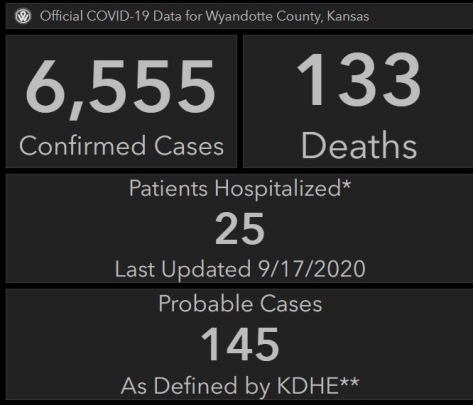
People who have shortness of breath with COVID-19 potentially could be affected by smoke in the atmosphere, and forecasters say there is a possibility that smoke could reach the surface on Monday in the Kansas City area.
At a University of Kansas Health System news conference on Friday, Sept. 18, doctors discussed the haziness in the skies caused by wildfires in the western United States. At that time the smoke was in the upper atmosphere here, not close to the ground.
The smoke itself isn’t making people more susceptible to getting COVID-19, and COVID-19 doesn’t survive in the blowing smoke, but there are some other health concerns with the smoke that health officials are discussing.
So far, the smoke hasn’t affected the surface atmosphere much in the Kansas City area, but that could change on Monday when some surface-based smoke could move into the area, according to the National Weather Service forecast.
People who are affected by the smoke are most likely to have underlying problems such as asthma, according to Dr. Steve Stites, chief medical officer at KU Health System.
In answer to a question, Dr. Dana Hawkinson, director of medical prevention and control at KU Health System, said the coronavirus itself is not being carried over several states in the smoke. Also, the smoke doesn’t make people more likely to get COVID-19, he said.
Amanda Gartner, RN, director of quality and safety at the KU Health System, said the smoke is affecting respiratory and allergy-type symptoms. Hays, Kansas, health care personnel recently were reporting more allergies and sneezing with the smoky skies.
The Kansas Department of Health and Environment has issued some guidance on dealing with the smoke in the atmosphere.
While most of the smoke remains high in the atmosphere, there are times when it is being observed at the surface and affecting air quality, according to the KDHE. Some of the health problems caused by the smoke include burning eyes, runny nose, coughing and illnesses such as bronchitis.
Those who have respiratory issues, pre-existing heart or lung diseases, children and elderly may experience worse symptoms, according to the KDHE.
The KDHE recommended, on days when particulate matter is present in the community, that healthy people should limit or avoid strenuous outdoor exercise. People with respiratory illness or heart-related illness should remain indoors, KDHE said.
People who are experiencing COVID-19 like symptoms, in particular respiratory or heart-related symptoms, who are currently infected or recently recovered, should stay indoors, according to KDHE.
In addition, KDHE recommended keeping indoor air clean by closing doors and windows and running the air conditioners with air filters; and keep hydrated by drinking lots of water.
Those who have symptoms such as chest pain, chest tightness, shortness of breath or severe fatigue should contact their doctors, according to the KDHE.
Current air quality across the U.S. can be viewed online at https://fire.airnow.gov/.
Wyandotte County reported an additional 47 COVID-19 cases on Saturday, for a cumulative total of 6,555, according to the Unified Government COVID-19 webpage. There were no additional deaths reported Saturday; the cumulative total was 133.
The KU doctors’ news conference is online at https://www.facebook.com/kuhospital/videos/726939051218838.
Some information about the possibility of smoke in the air on Monday is at https://forecast.weather.gov/product.php?site=EAX&issuedby=EAX&product=AFD&format=CI&version=6&glossary=1.
Information from KDHE about potential air quality effects of the smoke is at https://khap2.kdhe.state.ks.us/NewsRelease/PDFs/9-18%20wildfire.pdf.
The UG COVID-19 webpage is at https://alpha.wycokck.org/Coronavirus-COVID-19-Information.
The Unified Government COVID-19 hub outbreak map at https://wyandotte-county-covid-19-hub-unifiedgov.hub.arcgis.com/.
To see an NEA list of schools that have had COVID-19 cases, visit https://app.smartsheet.com/b/publish?EQBCT=aa3f2ede7cb2415db943fdaf45866d2f.
The KC Region COVID-19 Hub dashboard is at https://marc2.org/covidhub/.
The Unified Government Health Department is collecting input on people’s experiences getting tested for COVID-19 in Wyandotte County. The survey is on the UG website at https://us.openforms.com/Form/ea97a450-3d74-4d86-8d1f-6e340d55cf7c.
The UG Health Department new school and sports guidance is online at https://alpha.wycokck.org/files/assets/public/health/documents/covid/09042020fallsportsrecommendations.pdf.
A previous UG sports order is online at https://alpha.wycokck.org/files/assets/public/health/documents/covid/08132020localhealthofficerorderregardingsports.pdf.
The Wyandotte County school start order is online at https://alpha.wycokck.org/Coronavirus-COVID-19-Information.
Wyandotte County is under a mandatory mask order and is in Phase 3 of the state’s reopening plan. For more information, residents may visit the UG COVID-19 website at https://alpha.wycokck.org/Coronavirus-COVID-19-Information or call 311 for more information.
The KDHE’s COVID-19 webpage is at https://www.coronavirus.kdheks.gov/.
The CDC’s COVID-19 webpage is at https://www.cdc.gov/coronavirus/2019-nCoV/index.html.
